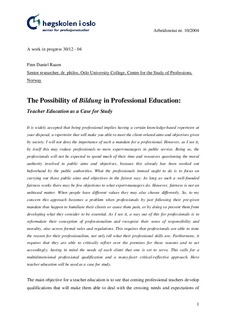The Possibility of Bildung in Professional Education: Teacher Education as a Case for Study
Working paper
Permanent lenke
https://hdl.handle.net/20.500.12199/3105Utgivelsesdato
2004Metadata
Vis full innførselSamlinger
- SPS - Documents [424]
Sammendrag
It is widely accepted that being professional implies having a certain knowledge-based repertoire at your disposal, a repertoire that will make you able to meet the client-related aims and objectives given by society. I will not deny the importance of such a mandate for a professional. However, as I see it, by itself this may reduce professionals to mere expert-managers in public service. Being so, the professionals will not be expected to spend much of their time and resources questioning the moral authority involved in public aims and objectives, because this already has been worked out beforehand by the public authorities. What the professionals instead ought to do is to focus on carrying out those public aims and objectives in the fairest way. As long as such a well-founded fairness works there may be few objections to what expert-managers do. However, fairness is not an unbiased matter. When people have different values they may also choose differently. So, to my concern this approach becomes a problem when professionals by just following their pre-given mandate thus happen to humiliate their clients or cause them pain, or by doing so prevent them from developing what they consider to be essential. As I see it, a way out of this for professionals is to reformulate their conception of professionalism and recognise their sense of responsibility and morality, also across formal rules and regulations. This requires that professionals are able to state the reason for their professionalism, not only tell what their professional skills are. Furthermore, it requires that they are able to critically reflect over the premises for those reasons and to act accordingly; having in mind the needs of each client that one is set to serve. This calls for a multidimensional professional qualification and a many-facet critical-reflective approach. Here teacher education will be used as a case for study.
